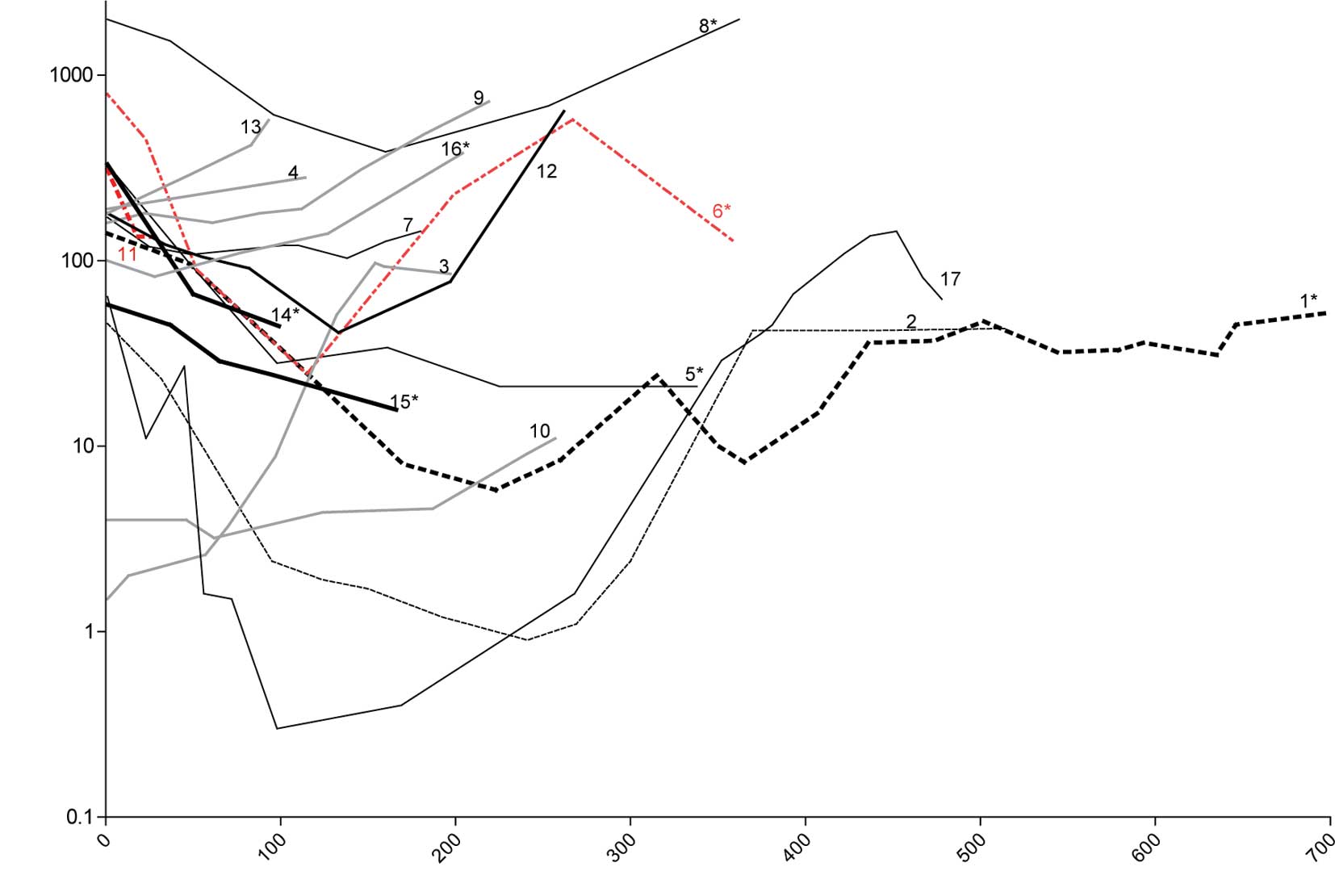|
1.
|
Damber JE and Aus G: Prostate cancer.
Lancet. 371:1710–1721. 2008. View Article : Google Scholar : PubMed/NCBI
|
|
2.
|
Calabro F and Sternberg CN: Current
indications for chemotherapy in prostate cancer patients. Eur Urol.
51:17–26. 2007. View Article : Google Scholar : PubMed/NCBI
|
|
3.
|
Mike S, Harrison C, Coles B, Staffurth J,
Wilt TJ and Mason MD: Chemotherapy for hormone-refractory prostate
cancer. Cochrane Database Syst Rev. CD005247:2006.PubMed/NCBI
|
|
4.
|
Kantoff PW, Halabi S, Conaway M, et al:
Hydrocortisone with or without mitoxantrone in men with
hormone-refractory prostate cancer: results of the cancer and
leukemia group B 9182 study. J Clin Oncol. 17:2506–2513.
1999.PubMed/NCBI
|
|
5.
|
Petrylak DP, Tangen CM, Hussain MH, et al:
Docetaxel and estramustine compared with mitoxantrone and
prednisone for advanced refractory prostate cancer. N Engl J Med.
351:1513–1520. 2004. View Article : Google Scholar : PubMed/NCBI
|
|
6.
|
Tannock IF, de Wit R, Berry WR, et al:
Docetaxel plus prednisone or mitoxantrone plus prednisone for
advanced prostate cancer. N Engl J Med. 351:1502–1512. 2004.
View Article : Google Scholar : PubMed/NCBI
|
|
7.
|
Gignac GA, Morris MJ and Hussain M:
Castration resistant, taxane-naive metastatic prostate cancer:
current clinical approaches and future directions. J Urol.
178:S30–S35. 2007. View Article : Google Scholar : PubMed/NCBI
|
|
8.
|
Bradley DA and Hussain M: Promising novel
cytotoxic agents and combinations in metastatic prostate cancer.
Cancer J. 14:15–19. 2008. View Article : Google Scholar : PubMed/NCBI
|
|
9.
|
Hanahan D, Bergers G and Bergsland E: Less
is more, regularly: metronomic dosing of cytotoxic drugs can target
tumor angiogenesis in mice. J Clin Invest. 105:1045–1047. 2000.
View Article : Google Scholar : PubMed/NCBI
|
|
10.
|
Kerbel RS and Kamen BA: The
anti-angiogenic basis of metronomic chemotherapy. Nat Rev Cancer.
4:423–436. 2004. View
Article : Google Scholar : PubMed/NCBI
|
|
11.
|
Kerbel RS, Klement G, Pritchard KI and
Kamen B: Continuous low-dose anti-angiogenic/metronomic
chemotherapy: from the research laboratory into the oncology
clinic. Ann Oncol. 13:12–15. 2002. View Article : Google Scholar : PubMed/NCBI
|
|
12.
|
Kikuchi Y, Kita T, Takano M, Kudoh K and
Yamamoto K: Treatment options in the management of ovarian cancer.
Expert Opin Pharmacother. 6:743–754. 2005. View Article : Google Scholar : PubMed/NCBI
|
|
13.
|
Stempak D, Seely D and Baruchel S:
Metronomic dosing of chemotherapy: applications in pediatric
oncology. Cancer Invest. 24:432–443. 2006. View Article : Google Scholar : PubMed/NCBI
|
|
14.
|
Tonini G, Schiavon G, Silletta M, Vincenzi
B and Santini D: Antiangiogenic properties of metronomic
chemotherapy in breast cancer. Fut Oncol. 3:183–190. 2007.
View Article : Google Scholar : PubMed/NCBI
|
|
15.
|
Ellerhorst JA, Tu SM, Amato RJ, et al:
Phase II trial of alternating weekly chemohormonal therapy for
patients with androgen-independent prostate cancer. Clin Cancer
Res. 3:2371–2376. 1997.PubMed/NCBI
|
|
16.
|
Lord R, Nair S, Schache A, et al: Low dose
metronomic oral cyclophosphamide for hormone-resistant prostate
cancer: a phase II study. J Urol. 177:2136–2140. 2007. View Article : Google Scholar : PubMed/NCBI
|
|
17.
|
Millikan R, Thall PF, Lee SJ, et al:
Randomized, multicenter, phase II trial of two multicomponent
regimens in androgen-independent prostate cancer. J Clin Oncol.
21:878–883. 2003. View Article : Google Scholar : PubMed/NCBI
|
|
18.
|
Tu SM, Millikan RE, Mengistu B, et al:
Bone-targeted therapy for advanced androgen-independent carcinoma
of the prostate: a randomised phase II trial. Lancet. 357:336–341.
2001. View Article : Google Scholar : PubMed/NCBI
|
|
19.
|
Logothetis CJ and Millikan R: Chemotherapy
for advanced prostate cancer: 25 years later. J Clin Oncol.
26:2423–2424. 2008.PubMed/NCBI
|
|
20.
|
Berruti A, Fara E, Tucci M, et al: Oral
estramustine plus oral etoposide in the treatment of hormone
refractory prostate cancer patients: a phase II study with a 5-year
follow-up. Urol Oncol. 23:1–7. 2005.PubMed/NCBI
|
|
21.
|
Bracarda S, Tonato M, Rosi P, et al: Oral
estramustine and cyclophosphamide in patients with metastatic
hormone refractory prostate carcinoma: a phase II study. Cancer.
88:1438–1444. 2000. View Article : Google Scholar : PubMed/NCBI
|
|
22.
|
Dimopoulos MA, Panopoulos C, Bamia C, et
al: Oral estramustine and oral etoposide for hormone-refractory
prostate cancer. Urology. 50:754–758. 1997. View Article : Google Scholar : PubMed/NCBI
|
|
23.
|
Eigl BJC, Eggener SE, Baybik J, et al:
Timing is everything: preclinical evidence supporting simultaneous
rather than sequential chemohormonal therapy for prostate cancer.
Clin Cancer Res. 11:4905–4911. 2005. View Article : Google Scholar
|
|
24.
|
Glode LM, Barqawi A, Crighton F, Crawford
ED and Kerbel R: Metronomic therapy with cyclophosphamide and
dexamethasone for prostate carcinoma. Cancer. 98:1643–1648. 2003.
View Article : Google Scholar : PubMed/NCBI
|
|
25.
|
Fizazi K, Le Maitre A, Hudes G, et al:
Addition of estramustine to chemotherapy and survival of patients
with castration-refractory prostate cancer: a meta-analysis of
individual patient data. Lancet Oncol. 8:994–1000. 2007. View Article : Google Scholar : PubMed/NCBI
|
|
26.
|
Wilkinson S and Chodak G: An evaluation of
intermediate-dose ketoconazole in hormone-refractory prostate
cancer. Eur Urol. 45:581–585. 2004. View Article : Google Scholar : PubMed/NCBI
|
|
27.
|
Harris KA, Weinberg V, Bok RA, Kakefuda M
and Small EJ: Low dose ketoconazole with replacement doses of
hydrocortisone in patients with progressive androgen independent
prostate cancer. J Urol. 168:542–545. 2002. View Article : Google Scholar : PubMed/NCBI
|
|
28.
|
Haines IE and Stanley RM: Perspective on
‘Chemotherapy for advanced prostate cancer: 25 years later’: Is it
a mirage or an oasis? J Clin Oncol. 26:4049–4051. 2008.
|















